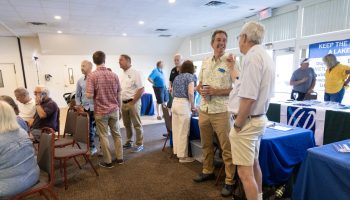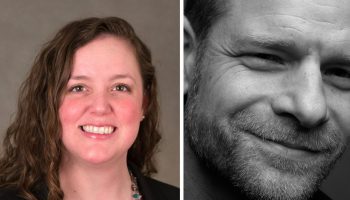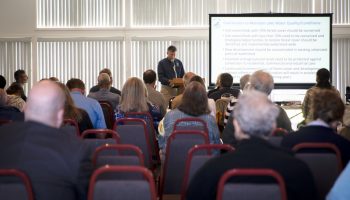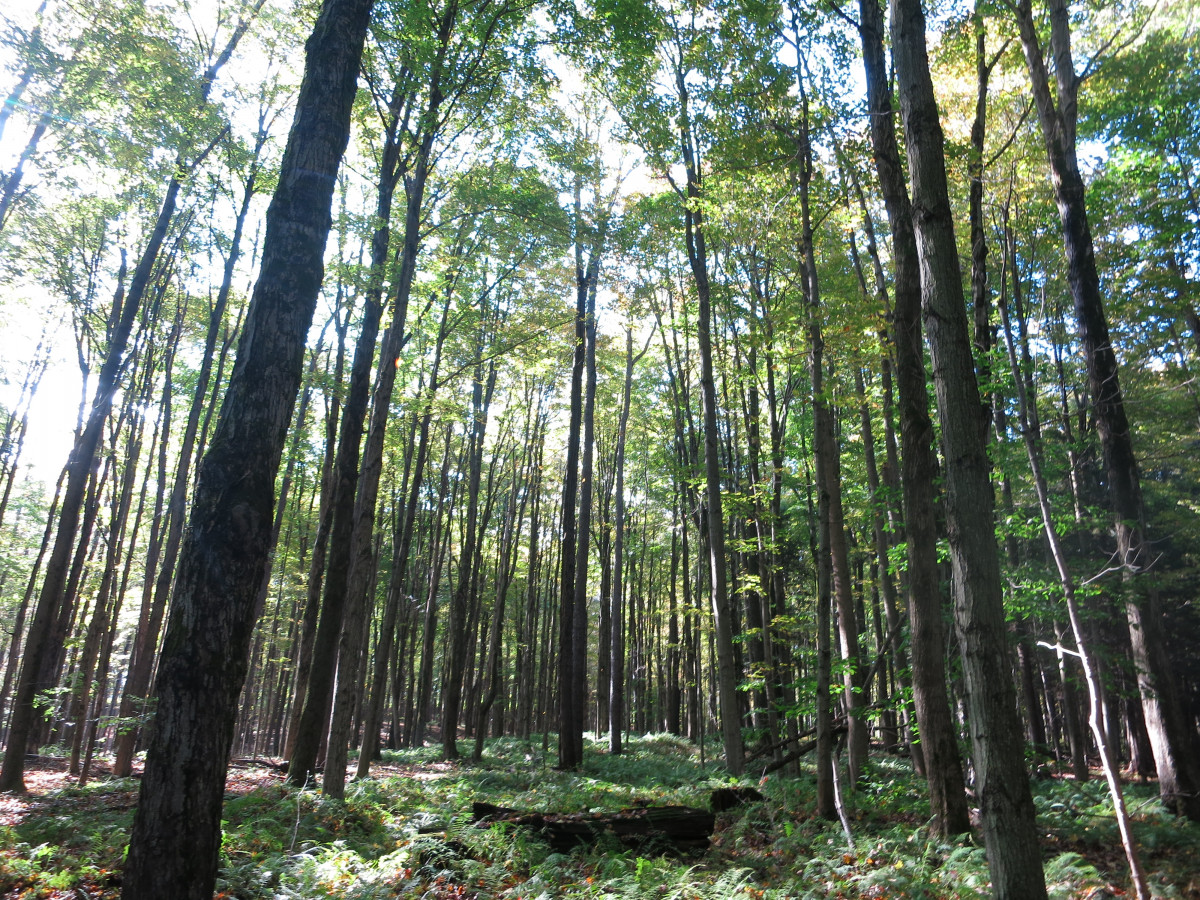 Nestled in Ellery, there is a forest thick with towering trees and winding streams in the watershed of Chautauqua Lake. Birds chirp and float from branch to branch as the flora and fauna bask in the summer sun. Deer pass through, nibbling on greenery and bedding down in the brush. This is First Forest.
Nestled in Ellery, there is a forest thick with towering trees and winding streams in the watershed of Chautauqua Lake. Birds chirp and float from branch to branch as the flora and fauna bask in the summer sun. Deer pass through, nibbling on greenery and bedding down in the brush. This is First Forest.
First Forest is more than a picturesque Western New York landscape. First Forest has made history. Year-round Chautauquans Ted and Deborah First purchased this property in 2013 out of their love for nature and hiking. But they longed to do more than just love the land.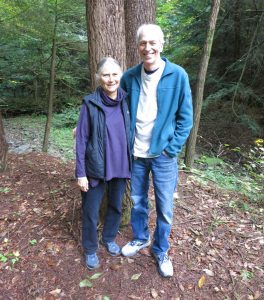
“We wanted to see if we could do more than be active land managers. Preservation wasn’t enough, because with the global impacts of invasive species and climate changes, you really need to take a more active role in terms of building a sustainable forest for the future,” Ted First said. “Then, we realized in the process of getting involved in that we needed a partner. We needed the skills of somebody that was committed to sustainable forestry that was going to deal with not just the woodlot, but all these other conditions — the invasive species, the overrun of deer, the climate change, the planning for the future.”
But, that partnership could not exist in preservation alone.
“What Ted and Deb have done for (FSF) is tremendously impactful, but I believe that the vision they have for the region is equally (impactful),” said Annie Maloney, executive director of FSF. “Their donation is quite visionary, to be the first that we’ve ever protected in New York State. To really want to see people come into the property to learn about sustainable forestry and to think in a different way about their property is a really big deal for the region, and of course is a big deal for a small organization like ours to be able to have a broader impact on our landscape.”
“In an area like Chautauqua County that has serious low employment opportunities — (to) integrate sustainable harvest into the long-term plan was the only thing that (made) sense to us. What people in this region don’t need is more land locked up in preservation that nobody can access,” Deb First said. “We wanted a management plan that would engage a handful of local people who would be able to make a living through the harvesting and processing of lumber. That was a pretty integral part. It should add to the community’s economic health, as well as add to the environmental health.”
While acting as a board member for the Chautauqua Watershed Conservancy, Ted First came across the Foundation For Sustainable Forests, a nonprofit land trust based in northwest Pennsylvania that protects and stewards 2,000 acres of working woodlands. By rehabilitating forests and setting up sustainable lumbering operations, FSF provides local jobs and improves ecological health to the regions it serves.
After two years of coordination, the Firsts finalized their 113-acre donation to FSF in 2019. Their agreement stated that the couple would maintain seven acres of meadow and a cabin, while FSF developed 106 acres.
“What Ted and Deb have done for (FSF) is tremendously impactful, but I believe that the vision they have for the region is equally (impactful),” said Annie Maloney, executive director of FSF. “Their donation is quite visionary, to be the first that we’ve ever protected in New York State. To really want to see people come into the property to learn about sustainable forestry and to think in a different way about their property is a really big deal for the region, and of course is a big deal for a small organization like ours to be able to have a broader impact on our landscape.”
FSF moved in to make improvements. First, they cleared pathways and reinforced banks to ensure easy access for the horse teams they used while lumbering — one of FSF’s most identifiable lumbering quirks.
“Horses are great, because they have less of a footprint on the forest floor when you’re getting logs out of a forest, but they can’t get out as long distance as a mechanical skidder — so therefore you have to improve … the access road so that a logging truck can get a little further so that the horses don’t have to get as far out,” Maloney said.
Then came the ecological improvements. FSF did an “ash salvage,” where they cleared white ash trees on the property that were dead or dying because of the invasion of the emerald ash borer — a beetle that’s feeding and egg-laying under the bark of ash trees and has decimated forests in 35 states in the last two decades. Some lumber could be used, some could not.
“There’s a little bit of a time sensitivity there, where it doesn’t take very long for those ash trees to no longer be commercially useful once they start to die,” Maloney said. “So we had to act quickly on that.”
After allowing the land to settle, land manager Guy Dunkle said he plans to selectively cut parts of the forest to allow new growth, giving the land structural and age diversity. Dunkle and his team will then create a strategy to diversify the trees in the forest as a response to the high numbers of hemlock and Sugar Maple trees, threatened by wipeouts due to disease and climate change, respectively.
While these improvements were being done, FSF tentatively scheduled the inaugural public event for the land — a woods walk — for spring 2021. Initially, it was set for spring 2020, and fall 2020, but was repeatedly postponed because of the COVID-19 pandemic. Through the walk, the public will learn about the FSF’s approach to sustainable forestry after the initial forest improvements are made.
One pillar of their forestry style is the worst-first method. Instead of clear-cutting large swaths of forest, the crew will strategically select individual trees for harvest. Maloney noted that the status quo in lumbering is to take the highest-grade wood first. FSF, however, targets compromised or less successful trees first.
There’s great joy in doing this,” Deb First said. “There’s a great joy in knowing that we’ve done something that lasts well beyond our lifetime — that will have a benefit to people who we’ll never meet and won’t care a fig if they ever know our names, but it will make a difference.”
“That’s always been an argument — like, ‘Oh, let’s take this beautiful healthy cherry tree and these two smaller compromised cherry trees next to them will thrive.’ Part of the reason that doesn’t really work for cultivating resilience and health in a forest is that then those already-compromised trees don’t do well. They’re more prone to wind damage or storm damage, and they also are the ones that are left to reseed the forest,” Maloney said. “Let’s send those (compromised trees) out, allowing the trees that have been more successful to continue to thrive and reseed the forest — but (also create) space for regeneration in the forest floor.
Maloney noted that this approach is uncommon, because it does not offer an immediate flood of profit for the owner.
“The difference of that approach is at any one time, there’s not going to be as big of a net revenue for the land owner. They’re not going to get as big of a check as you might get in … (a strategy of) ‘take the best and leave the rest,’” Maloney said. “But if you do the worst-first (strategy) in a more frequent, but less intense, manner over time, you play the long game. The economic yield can be comparable. Certainly, the ecological benefits … show themselves over time with healthier, more resilient forests.”
FSF believes lumbering efforts in Ellery will bring new jobs to Chautauqua County. The project will offer jobs for horse crews, log haulers, truck drivers, excavating crews, understory managers and invasive plant managers.
Like the financial outcomes of this type of lumbering, the partnership of goals and values between the Firsts and FSF will have a lasting legacy on the economy and the ecology of Chautauqua County.
“There’s great joy in doing this,” Deb First said. “There’s a great joy in knowing that we’ve done something that lasts well beyond our lifetime — that will have a benefit to people who we’ll never meet and won’t care a fig if they ever know our names, but it will make a difference.”


